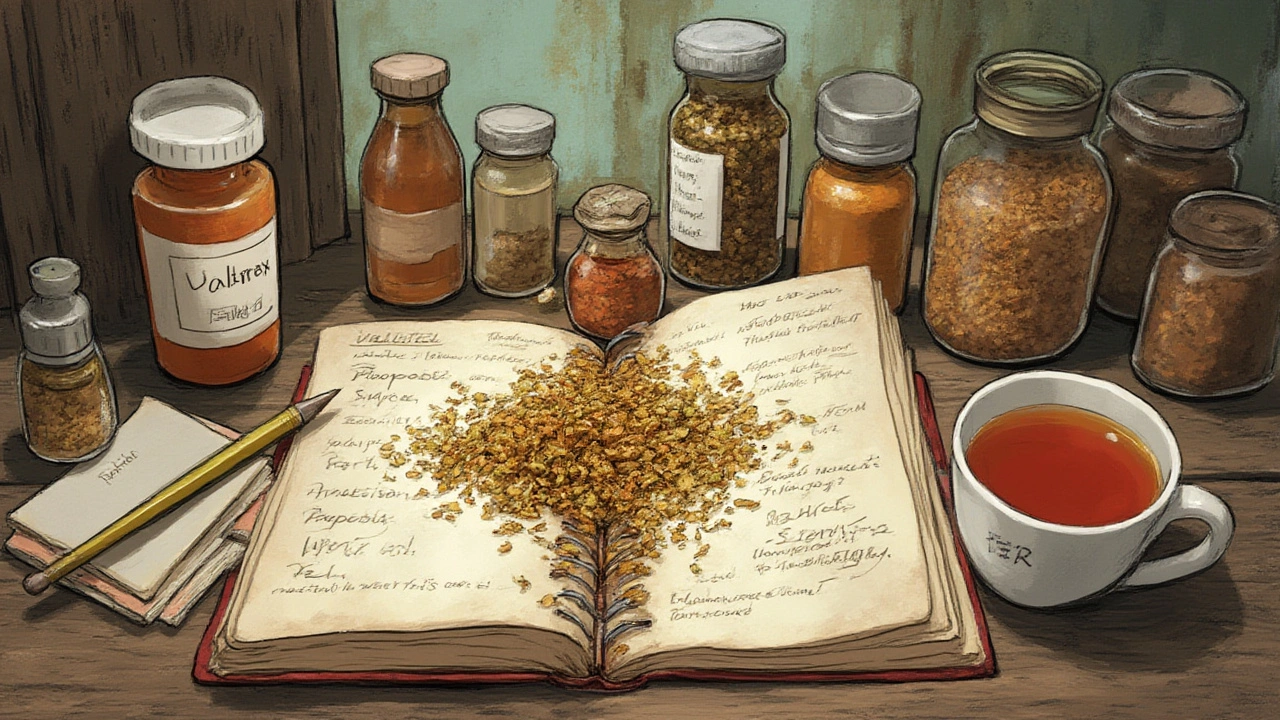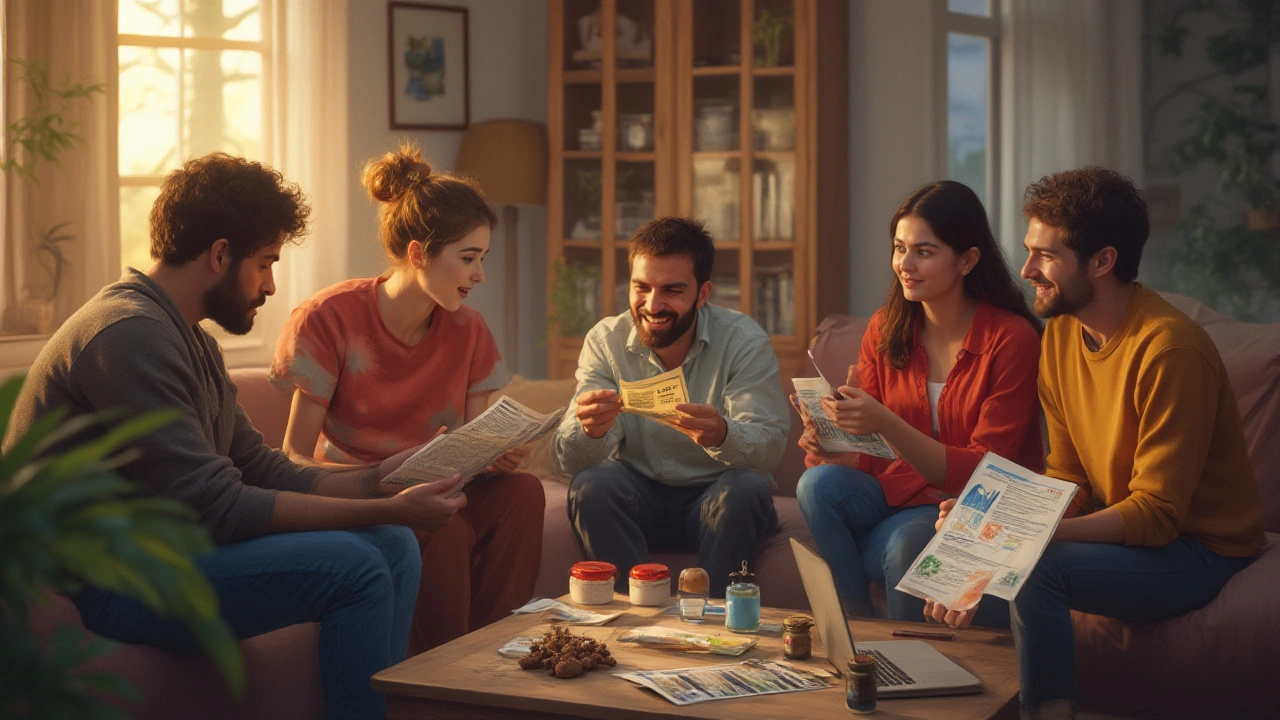Imagine waking up on a big day—job interview, first date, or family photo—and there it is. A cold sore. No matter how fast you scramble for your Valtrex prescription, you know the drill: tingling, then that embarrassing lip flare-up. The kicker? Some folks are looking for something less pharmaceutical and more "earth-grown." So, what’s legit when it comes to Valtrex alternatives? Do herbal remedies like lysine and propolis actually stack up—does science agree, or are we just hoping for a miracle in a bottle of bee goo or amino acids?
Lysine: Can an Amino Acid Really Stop Cold Sores?
Lysine isn’t some exotic ingredient. It’s an essential amino acid your body uses for all kinds of things—including making proteins. But here’s the claim: lysine can stop herpes simplex virus (HSV) in its tracks, which is the virus that gives you cold sores. The theory is wild but simple. HSV needs another amino acid, arginine, to multiply. If you’ve got more lysine than arginine floating around, maybe—just maybe—the virus gets thrown off its game.
So, what does real research say? Clinical trials have given lysine both a thumbs up and a shrug. A Canadian double-blind study published in 1987 showed that a daily dose of 1,000 mg lysine reduced recurrence and healing time for many people with recurrent herpes labialis (cold sores). Folks taking lysine daily had fewer outbreaks and those outbreaks didn’t last as long. But not every study agrees. Some more recent research points out that low doses might not work at all, and others found zero difference from placebo, especially for folks who only took lysine when outbreaks started, instead of using it daily. That means the magic, if it exists, may depend on both the dose and whether you’re taking lysine all the time—not just when things go south.
But how much is "enough"? Most researchers who've seen any benefit used daily doses between 1,000 mg and 3,000 mg. Anything more can come with stomach upset and possibly kidney trouble, so pushing past that isn’t a great idea. If you eat lots of lysine-rich foods—think chicken, eggs, legumes—you actually might already be supporting your body’s natural defenses. Some people keep lysine supplements around for potential cold sore disasters. Tip: Always check with your doctor, especially if you have kidney issues or take meds that affect amino acid levels.
Curious about stacking your odds without popping extra pills? Lower your dietary arginine: cut back on chocolate, peanuts, and certain seeds. But don’t go fully lysine-obsessed—balance matters unless you’re chasing a strict protocol, and nobody needs a legume-only diet for a year.

Propolis and Herbal Balms: Sticky, Sweet, and Scientific?
Propolis is bee magic—literally. It’s the sticky stuff bees use to glue together their hives, packed with flavonoids and compounds that scream "natural defense." Eastern medicine has raved about propolis for centuries, but does slathering bee glue on your lip help stop herpes?
Turns out, nature’s little apothecaries may be onto something, at least according to modern science. A 2020 review in the "Journal of Integrative Medicine" highlighted multiple studies showing propolis beats some traditional treatments at healing cold sores—especially if you apply it the second you feel that signature tingle. One standout German study compared propolis ointment to acyclovir cream (the go-to antiviral) in treating herpes outbreaks. The propolis users healed faster—on average about a day earlier—and reported less pain. That’s impressive for something you’d expect from a beehive.
Besides propolis, other plant-based balms are hot topics: lemon balm (Melissa officinalis) showed effectiveness in at least two solid studies, both reducing healing time and lowering recurrence rates. Researchers think the oil’s rosmarinic acid blocks HSV’s ability to infiltrate cells—a pretty direct defense. And if you’re a fan of essential oils, tea tree and peppermint also have some lab data (mostly test tube stuff, so less certain in real-life lips) against HSV. Always, always patch-test oils before going full-on application; lips can be sensitive and who wants an allergic reaction on top of a cold sore?
So, where can you find good propolis balm? Pharmacies, health shops, even some organic grocers keep it in stock. Buzz-worthy tip: Look for creams with at least 3% propolis. If your outbreak is relentless or deep, it’s smart to stick with prescription antivirals—especially for people who are immunocompromised.

Sorting the Science: Is There a True Natural Alternative to Valtrex?
Here’s where things get interesting. People desperate for a natural alternative to Valtrex can find a long list of supposed cures online—everything from olive leaf extract to echinacea. But separating solid evidence from wellness-hype is crucial.
Let’s look at what stacks up:
- Lysine: Works for some, especially as preventive. Needs consistent, daily use at a decent dose. Not a magic bullet, but legitimate for recurrent suffered if allergies/pre-existing conditions don’t rule it out.
- Propolis: Shows real promise for topical treatment, often healing sores about as well, or better, than standard creams.
- Lemon balm: Proven in two clinical studies to speed up healing and possibly lower recurrence, if used at the very first sign of an outbreak.
- Other herbs (e.g., echinacea, olive leaf): Not enough clinical data, mostly based on test tube or animal studies. More research needed before you swap your meds for these.
- Diet switches: Lowering arginine and boosting lysine through food is safe and easy, but don’t expect miracles over one weekend. Consistency matters.
What about side effects? Natural doesn’t mean risk-free. Lysine, in high doses, can trigger gastrointestinal complaints. Propolis allergies do exist; if you’re allergic to bees, be careful. And herbs and supplements may interfere with regular meds—never mix without a quick doctor consult. Pregnant or breastfeeding? Steer clear unless your provider gives a thumbs-up.
For those who prefer natural over pharmaceutical, the bottom line: early application is everything. Whether you grab a jar of propolis balm or start ramping up lysine, waiting until a cold sore is in full bloom is almost always too late. Even antivirals work best if you use them at the "tingle stage." Don’t expect antioxidant-rich honey or echinacea drops to erase a sore overnight—science says those are far more hit-or-miss.
Besides the products, lifestyle matters, and maybe more than you think. Cold sores are not just a virus—triggers include stress, sun exposure, sleep deprivation, even your period. Small changes can help: wear lip sunscreen, try to chill on stressful days, get sleep. Every bit counts if you want fewer outbreaks or milder ones.
So, is there a miracle "natural alternative" as effective as Valtrex? Not quite. But lysine, quality propolis ointment, and maybe a lemon balm cream can keep your lips safer—and when paired with healthy habits, might just get you through wedding season or graduation photos without drama. Cold sores aren’t going anywhere, but you’ve got more science-backed choices now than ever before.


7 Comments
July 23, 2025 Ira Andani Agustianingrum
Hey there, I totally get the frustration of waking up with a cold sore right before something important. Lysine can be a helpful preventive tool, especially if you stick to a consistent daily dose of about 1–3 grams. Pair it with a diet low in arginine-think swapping out chocolate for more chicken or eggs-to give your body the best odds. Propolis ointments with at least 3 % concentration have shown real‑world benefits in a few studies, so they’re worth a try if you catch the tingling early. Just remember to patch‑test first and keep your doctor in the loop if you have kidney concerns. You’ve got a solid plan now, go rock that interview!
July 25, 2025 James Higdon
One must approach alternative therapies with a healthy dose of skepticism, for the allure of “natural” often masks a lack of rigorous evidence. While lysine and propolis have modest data supporting their use, they cannot supplant the proven efficacy of antiviral agents such as Valtrex. It would be irresponsible to encourage patients to abandon prescription medication based on anecdotal success stories. Moreover, the unregulated supplement market may expose individuals to contaminants or inconsistent dosages. Ultimately, ethical medical practice demands that we prioritize safety and scientifically validated treatments above convenience.
July 26, 2025 Wanda Smith
Consider, if you will, the silent pact between the pharmaceutical conglomerates and the very notion of “natural” healing that we are told to distrust. They have, for decades, engineered a narrative in which every herb, every amino acid, is reduced to a marketable commodity, stripped of its cultural context, and repackaged as a quasi‑miracle. This is no accident; it serves the dual purpose of keeping us dependent on a cycle of prescriptions while simultaneously feeding the alternative‑health industry that they themselves have fostered. When you read about lysine reducing recurrence rates, you must ask who funded that study and whether the data was filtered through a veil of bias. The same applies to propolis, the so‑called bee‑derived “cure,” which is promoted by a network of small‑scale producers paid handsomely to flood the market with glossy jars of ointment. In a world where viral patents are renewed yearly, the push for “herbal alternatives” looks less like scientific progress and more like a distraction. It is a carefully choreographed performance designed to make the consumer feel empowered while still pulling the strings of profit behind the scenes. It is a subtle, almost imperceptible, influence of regulatory bodies that oscillate between silence and condemnation, ensuring that only the approved drugs receive a clear path to the pharmacy shelf. Meanwhile, the almond‑sweet taste of lemon balm, the tang of tea tree oil, and the earthy scent of echinacea are marketed as panaceas, each accompanied by a footnote of “further research needed.” This phrase, far from being a disclaimer, is a strategic placeholder that delays accountability. The fact that you can find a 3 % propolis cream on a grocery shelf, endorsed by a celebrity influencer, tells you that the market has already won the battle of perception. What remains hidden is the potential for these natural compounds to be co‑opted into the very pipelines they claim to oppose, becoming the next line of patented extracts sold at premium prices. Moreover, the internet amplifies the echo chamber, allowing unverified claims to cascade through forums, Reddit threads, and YouTube monologues faster than any peer‑reviewed journal can publish. The cumulative effect is a population that is simultaneously skeptical of traditional medicine yet naïvely trusting of “organic” by default. In this tangled web, the truth about whether lysine truly halts HSV replication or propolis accelerates healing is not lost; it is merely obscured by layers of commercial interests. The only reliable compass, therefore, is rigorous, transparent research that is free from corporate sponsorship and presented without the flourishes of marketing spin. Until such a compass is universally accepted, we remain adrift in a sea of half‑truths, each wave promising relief but leaving the shore just as bruised as before.
July 27, 2025 Bridget Jonesberg
Wanda, your exposé reads like a manifesto penned in a dimly lit library where the dust of forgotten pharmacology settles on every page. While I appreciate the theatrical flair, one must also acknowledge that not every researcher is a puppeteer and not every study is an instrument of profit. The lysine trials you mention did indeed involve funding sources, yet the data replicated in independent labs, suggesting a signal beyond corporate interference. Moreover, the propolis ointments discussed have been standardized by European pharmacopeias, which imposes strict quality controls that sabotage the notion of “unregulated” chaos you describe. It is a tragic drama when we conflate the missteps of a few with the entire edifice of scientific inquiry. Still, your cautionary tale serves a purpose: it reminds us to scrutinize provenance before swallowing the sweet honey of convenience. In the end, perhaps the most elegant solution lies somewhere between your conspiratorial horizons and the measured clinic, a middle ground where evidence and ethos coalesce.
July 28, 2025 Marvin Powers
Ah, the middle ground-so elusive it might as well be a unicorn in a lab coat! Honestly, if we could all just sip lysine smoothies while applying propolis like a spa treatment, the world would be a glittering utopia of painless lips. But let’s be real: people need options that fit their cultural habits, whether that’s a Bollywood‑inspired herbal tea or a Southern‑style honey balm passed down through generations. I love how you both champion rigorous standards yet sprinkle in drama; it’s the perfect seasoning for a Reddit thread. So, here’s my two‑cents: try a daily 2 g lysine dose, keep a propolis tube handy for the dreaded tingle, and never underestimate the power of a good lip sunscreen. If the viruses still persist, at least you’ll have a story to tell at family gatherings about the time you outsmarted the pharmaceutical giants with a dab of bee glue. Keep smiling-your lips will thank you, and your immune system will probably roll its eyes in admiration.
July 29, 2025 Jaime Torres
Nice summary.
July 30, 2025 Wayne Adler
Look, i get the hype but you cant just throw lysine and propolis at every break out and expect miracles. The truth is hte virus is a sneaky bastard that will find a way around any home brew if you dont keep your immune system sharp. stop acting like you own the cure-i’ve seen enough “natural” scams to know better. If you want real relief, consult a doc, dont just paste some bee goo on and hope for the best. And yeah, i’m angry about the whole conspiraciy spiel, but i’m also tired of people making it sound like a grand plan when it’s just good old biology. get real, stay safe.
Write a comment